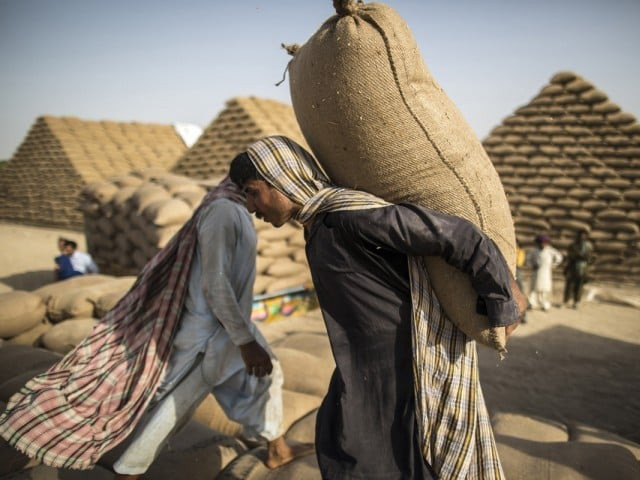Russia wheat to be imported against cash
Barter trade had earlier been proposed due to sanctions imposed by West

Pakistan on Saturday decided to directly import two million metric tonnes of wheat from Russian on cash while dropping a barter trade plan, as it also approved Rs160 billion supplementary grants to ensure uninterrupted supply of food, fuel and electricity.
The decisions were taken by the Economic Coordination Committee of the Cabinet that approved Rs62.3 billion more for payments of fuel subsidies, Rs50 billion to reduce power outages and over Rs36 billion for giving targeted subsidies to the poorest families and paying for the subsidised essential commodities at the Utility Stores.
The ECC also temporarily waived off additional customs duties on import of edible oil to incentivise the suppliers to fast track the shipments in June. Finance Minister Miftah Ismail presided over the ECC meeting.
“The ECC allowed import of two million metric tonnes of wheat on a government-to-government basis'' from Russia, stated the finance ministry. The Pakistan Agricultural Storage and Services Corporation (Passco) will be the recipient agency for the imported wheat from Russia as per the existing arrangement.
The Ministry of National Food Security had proposed that the Foreign Office and the Ministry of Commerce should jointly explore the possibility of barter trade with Russia due to sanctions imposed by the West.
However, there are no sanctions on the import of grains from Russia but the government would have to work out a mechanism to make the payments after Moscow has been thrown out of the global payments clearing system –the Society for Worldwide Interbank Financial Telecommunication (Swift).
This month the federal cabinet had allowed import of three million metric tonnes of wheat, including one million metric tonnes, through international open tenders.
The wheat output decreased by one million metric tonnes to 26.4 million metric tonnes this year but the consumption is estimated at 30.4 million tonnes. Pakistan faces four million metric tonnes of wheat shortage, as global prices soar due to the Russia-Ukraine war.
Accordingly, the first international tender for import of 500,000 metric tonnes of wheat was issued on May 16 for shipments in June-July 2022. As per bid evaluation committee report, the lowest responsive bid came from M/s Falconbridge Resources at the rate of $515.49 per metric tonne.
As per the Pakistan Bureau of Statistics (PBS),the per 40kg cost of domestically available wheat is Rs2,511 or Rs63 per kilo – whereas the estimated landed cost at port of imported wheat offered comes to Rs4,618 per 40kg or Rs115 per kilo, which is Rs2,106.88 per 40kg higher than the domestically available wheat.
The ECC also approved Rs7.3 billion bridge financing for supply of wheat flour at Rs40 per kilo in Punjab. The Punjab government cannot approve any subsidy amount at this time in absence of a provincial cabinet. The ECC decided that in case subsidy is not approved by the Punjab cabinet, the shortfall will be bridged by the federal government but the Punjab government will ensure that the provincial cabinet approves the package as soon as its meeting is convened.
The ECC approved Rs62.3 billion for making payment of price differential claims to oil marketing companies and refineries for the second fortnight of May 2022 to pay for the fuel subsidies. This has brought the total subsidies to Rs211 billion for three months – far higher than Rs110 billion initially estimated by the last PTI government for a four-month period.
The subsidies’ amount would reduce next month due to the government’s decision to increase the prices by 25% from May 26. The ECC also approved Rs24 billion supplementary budget to pay for the cost of Rs28.6 billion PM’s targeted subsidy package for the poor to offset the impact of increase in fuel prices.
The ECC approved Rs50 billion subsidy to clear the dues of the power sector aimed at reducing the unannounced power outages period. At present, there is load-shedding of around eight to 10 hours a day due to the government’s inability to run the power plants owing to resource constraints.
The ECC also approved a summary submitted by the Pakistan Atomic Energy Commission for grant of extension in the construction period of K-2 from November 20, 2020 to May 21, 2021 and K-3 from September 30, 2021 to April 18, 2022 for ensuring disbursement of pending loan of $383 million before expiry of loan availability on June 3, 2022 from Exim Bank, China to the contractor, who has already completed the project.
The Ministry of Industries and Production submitted a summary on the continuation of the PM relief package – 2020 for the months of May and June, 2022 through the Utility Stores Corporation. The ECC after deliberation allowed continuation of existing subsidy for two weeks on essential commodities (atta, sugar, rice and pulses), and Rs100 per kilo subsidy on ghee at the USC. The Finance Division will also release the outstanding amount of Rs11 billion on account of subsidy under the PM relief package – 2020 approved by the ECC for the previous months. It also allowed additional subsidies for a two-week period.
The ECC allowed import of 200,000 metric tonnes of granular urea from China on government-to-government basis on deferred payment basis within 90 days. The country will pay 4.35% interest rate on the $120 million amount, as it does not have money for import.
The ECC did not exempt Rs2.5 billion tax on about $600 million being executed by the Saudi Fund for Development (SFD). In Pakistan, the SFD is providing assistance for various projects including energy, health, education and infrastructure projects.
The ECC, considering the comments of the Federal Board of Revenue on the subject, suggested that a tax-exemption clause for the SFD may be inserted in the money bill, considering strong and strategic relationship between Pakistan and the Kingdom of Saudi Arabia, encompassing economic cooperation and investment.
Saudi Arabia has conditioned the $845 million loan payments’ suspension with tax waivers.
The Ministry of Commerce submitted a summary on duty structure on import of edible palm oil.
The ECC allowed removing 2% additional customs duties on import of palm oil for shipments originating from all sources except Indonesia for June10-20, 2022, subject to approval of the federal cabinet.
The ECC approved Rs7.6 billion supplementary grant for the Federal Directorate of Immunisation (FDI). It gave another Rs2.44 billion to the Ministry of Religious Affairs and Interfaith Harmony for grant of one-time support of Rs150,000 per pilgrim under the government Hajj Scheme.
This will bring down the cost for 32,453 pilgrims to Rs700,000 for this year’s Hajj.



















COMMENTS
Comments are moderated and generally will be posted if they are on-topic and not abusive.
For more information, please see our Comments FAQ